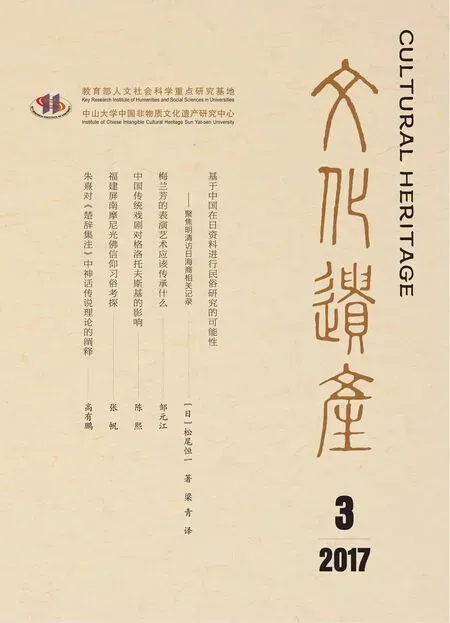Main Abstracts
2017-01-27
Main Abstracts
The Possibility of Folklore Studies Based on Chinese Documents in Japan: Focus on the Records of Maritime Businessmen Visit Japan during the Ming and Qing Dynasty
WrittenbyMATSUOKoichi,TranslatedbyLIANGQing1
Folklore studies on the subjects of national or regional life and culture, and collects information by fieldworks in order to go forward. In the mean while, there are some valuable folk materials left by the foreign visitors came for traveling or business, whom recorded the customs they saw and felt strange. Moreover, some folk relics flowed aboard through trade or other legal ways, or even illegal ways like theft or loot, have often been ignored. In the Qing dynasty, while China-Japan diplomatic relation had not been established, the maritime businessmen brought silk, sugar, deerskin, traditional Chinese medicine, and other products from China to Nagasaki, which greatly influenced the Japanese’s daily lives. Meanwhile, the Chinese folk culture, such as the dragon-boat race and Mazu parade, had also been spread to Nagasaki, and passed on by the Japanese and overseas Chinese. On the other hand, Dutch was the only country trade with Japan in the Qing dynasty, and left records of the trade and life of the maritime businessmen. This article will investigate the records of China and Dutch maritime businessmen visit Japan during the Ming and Qing dynasty, and the documents about lives and beliefs of the maritime businessmen recorded by the European maritime and Catholic missionaries. On this basis, surpassed the folklore studies of one country or region, we can explore some characteristic of lives of one region in the international relations, and find new possibilities of folklore.
What should be Inherited from Mei Lanfang’s Performing Art?
ZOUYuanjiang33
The core spirit of Mei Lanfang’s performing art should be the distinctive sense of time, which is the spirit of innovation. It is based on two important premises: attach great importance to the accumulation of traditional performing art, and think industriously in art creation. The first one involves the technique basis of Mei Lanfang’s performing art, which is deeply impacted by all the performing skills he learn from early age. The second one emphasizes the rational thinking of creation that cannot be influence by the blind and irrational urge. This is the secret of Mei Lanfang to being creative and popular in his artistic career more than fifty years.
Traditional Chinese Theatre’s Influence on Jerzy Grotowski
CHENXi64
Polish director Jerzy Grotowski enjoys a high reputation in the field of the Western theatre, even that of China. In around recent ten years, Chinese scholars, in a view of “theatre anthropology”, have started to study and analyze Grotowski’s theatre theories, methodologies and practices, which relate to ritual and the related. Indeed, it can’t be ignored that his theatre research is undoubtedly influenced by the Eastern traditions, beliefs and thoughts, let alone traditional Chinese theatre. In 1962, he came and stayed in China for one month investigating traditional Chinese theatre. When returned Poland, he applied a couple of methods he learned from the experience to his actor’s training. Until late in life, when Grotowski pondered the essence of theatre, he could hardly think without the reflection on the traditional Eastern theatres, such as Jingju (Peking Opera).
A Study of the Religious Belief of Mani in Pingnan County of Fujian Province
ZHANGFan88
Recently, after series of literature of Manichaeism found in Quanzhou, Putian, Fuzhou and Xiapu, some Manichaeism textbook in folk and three Buddha Statues of Mani were found in Pingnan County of Fujian Province. There was a special living religious belief of Mani in Pingnan County, and also a similar religious belief was found in the surrounding areas. This special religious belief of Mani is a derivation and change of Manichaeism when it went through the folk society.
Zhu Xi’s Interpretation of the Myths and Legends in “Chu Ci Variorums”
GAOYoupeng118
“The songs of Chu” can be called the kingdom of myth and legend. It is an expression of the memories of history including the unimaginable reality, and also a content of the authenticity of history and culture. Zhu Xi regarded the myths and legends in “The songs of Chu” as the truth of history, and made dialectical analysis on them, which were theoretical interpretation of rationalism mostly from the view of historical and cultural rationality.
